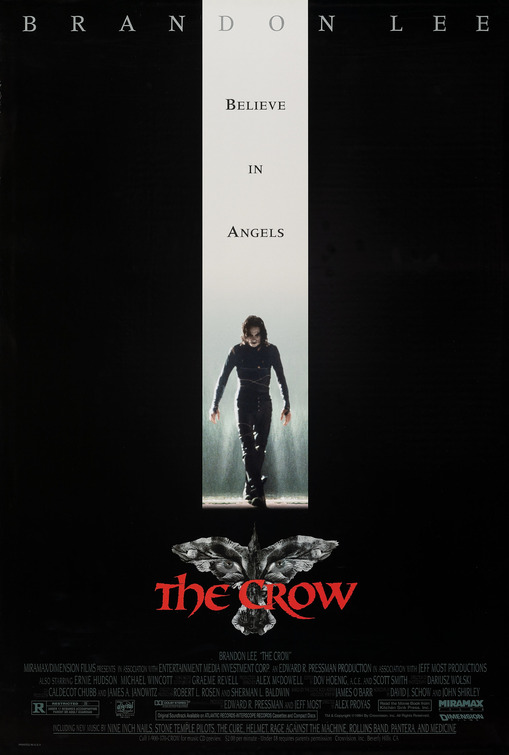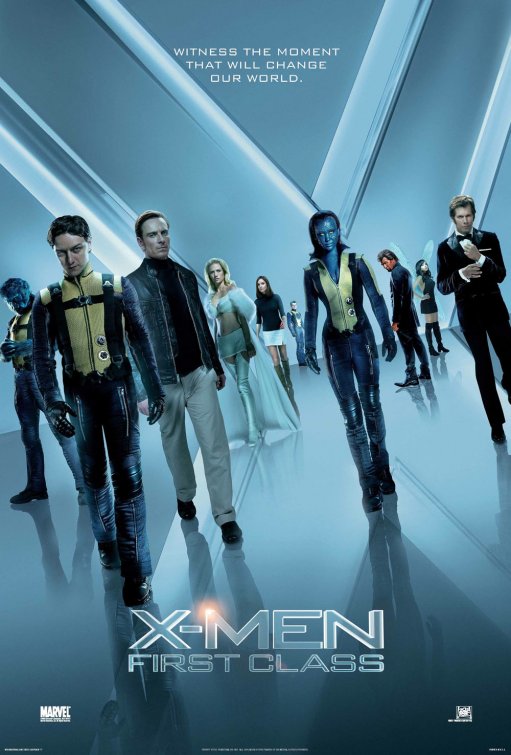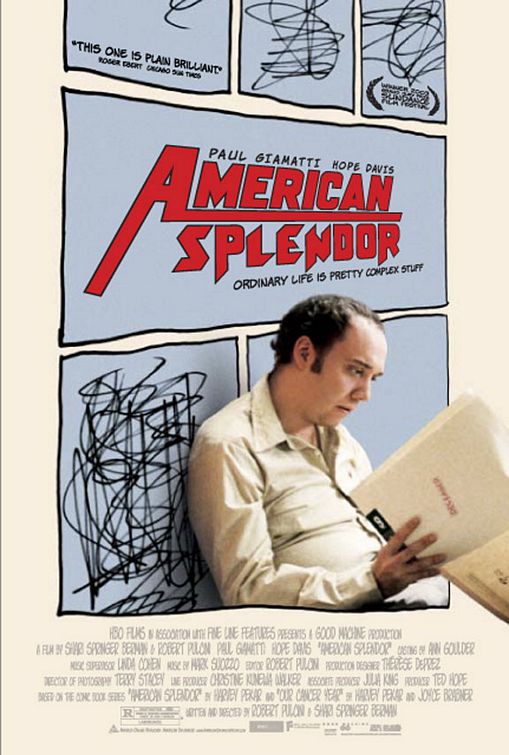
It seems almost every genre has its day, be it the noir of the 30's, the action movie of the 80's or the "indie" film of the 90's. This decade, this time in cinema, has truly proven itself to belong to the masked men. Critic after critic has whined and moaned that the "superhero" movie is killing the originality of cinema, as filmmakers now all turn to comic book pages as opposed to turning to...regular book pages...or real life...ok, Hollywood's never been that original, and now the old guard is getting pissy that the times, they are a'changin. Yes, sometimes the stories are cliche, but such is true of the Western and the noir, and both are currently beloved by film scholars as "important genres". So now, with this summer bringing the climax of both Marvel and DC's cinematic powerhouses, its time to let the critics get all the venting out and start accepting comic book movies as a significant genre. Graphic novels have inspired some great works of cinema, and it'd be foolish to deny that. So let's do the opposite. Let us now praise famous supermen, and take a look at the Top 40 movies based on comic books.

40.) Thor (2011) dir. Kenneth Branagh
One of the many brainchildren of Stan Lee and Jack Kirby, one would think it would be impossible to bring the most mythological of Marvel heroes to the screen in this age of comic book realism, but helmed by Bard-lover Kenneth Branagh, Thor came to life on screen as the god he truly is, even if the movie made him an alien.
 |
| Kenneth Branagh only takes on the works of Shakespeare and Stan Lee. |
39.) Kick-Ass (2010) dir. Matthew Vaughn
Based on Mark Millar and John Romita Jr. story of a regular kid who takes on a super heroic persona, Kick-Ass was too violent and out-there for critics and audiences in its day, but functioning as both a fun exploration of the superhero and at times a critique of the violence of modern masked men, Kick-Ass did just as its title suggested.
 |
| Why you'd want to become a superhero when you're already the Eighth Doctor beats me, but to each their own. |
38.) The Dark Knight Rises (2012) dir. Christopher Nolan
A controversial spot for a film fanboys were dubbing "the greatest movie of all time" before it was even written. But time will likely cause viewers to see it fit its placement. Its not nearly as strong as the other two Nolan films, its slow and inconsistent, and wastes characters and plot lines. So why even put it on the list? Because in the moments when The Dark Knight Rises works, it soars. Catwoman has her definitive depiction, Gotham gets pushed to the brink of destruction, and Nolan gives the caped crusader something no writer has done in his 75 year history: He gave him a happy ending.
 |
| When Gotham is in ashes, then you have my permission to actually understand a god damned word I'm saying. |
37.) Watchmen (2009) dir. Zack Snyder
The man now at the helm of the new Superman film once tackled the greatest graphic novel of all time, Alan Moore and Dave Gibbons' Watchmen. Though about as impossible to bring to the screen as the densest of post-modern literature, Snyder (especially in his directors cut) did a extremely admirable job, with Jackie Earl Haley giving an Oscar-worthy performance as the demented and tormented Rorschach. Loathed on its release for a certain swinging blue pipe of doom dangling from Billy Crudup, upon rewatching, one will discover that Watchmen, though it made tweaks to the comic, did it as much justice as any movie could. And the opening credits set to a Dylan track go down as one of the best credit sequences in any movie, hands down.
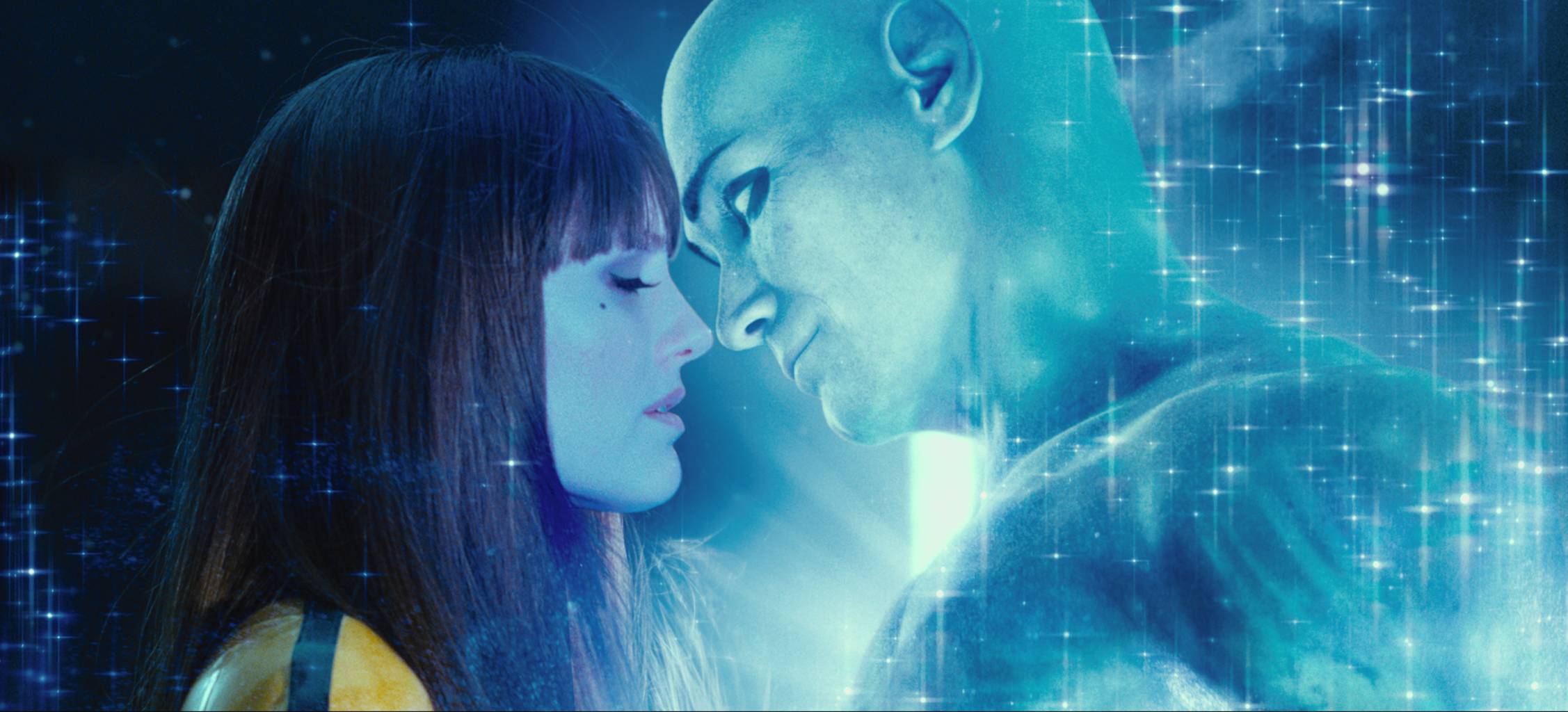 |
| And that's when the chick from Children's Hospital kissed a naked smurf. |
36.) Blade (1998) dir. Steve Norrington
The film the revitalized both Welsey Snipes career and the comic book movie, Blade was an obscure vampire hunter out of Marvel comics with a complex mythology of day-walkers and half-bred vampires. But the film worked brilliantly, with badass characters and thrilling action. Norrington's vampire adventure inspired a vampire craze, 1,000 shit Underworld movies, two forgettable sequels, and...oh yeah, the entire Marvel comic book movie boom.
 |
| For most people, the only things for certain are death and taxes. So for Wesley Snipes as a vampire...its neither. |
35.) Danger: Diabolik (1968) dir. Mario Bava
Slick, sexy and sixties as all holy hell, the Italian comic book criminal Diabolik was brought to the screen in stellarly fashionable fashion is this crime thriller that's Bond as a bad guy. One man's campy is another man's cool, sure, but Diabolik is as cool as they come, robbing from the rich to give to the girls, as the American trailer says. Hard to track down on DVD, but a great find if you can get it.
 |
| If anyone decides this film needs a "gritty reboot", I'll already confess to the murder. |
34.) Iron Man 2 (2010) dir. Jon Favreau
Tony Stark spends the first 15 minutes of the film as John Galt incarnate, and spends the rest being torn apart by both a product of his father's greed (Whiplash) and his own ego (alcoholism). Tony Stark is more human in this sequel, its villain more relatable, and indeed though he invents his own element, Iron Man 2 feels more grounded than its original at times, dealing with the aftermath of a hero going public. Plus it introduces one of Marvel's most underrated characters to the screen: Black Widow.
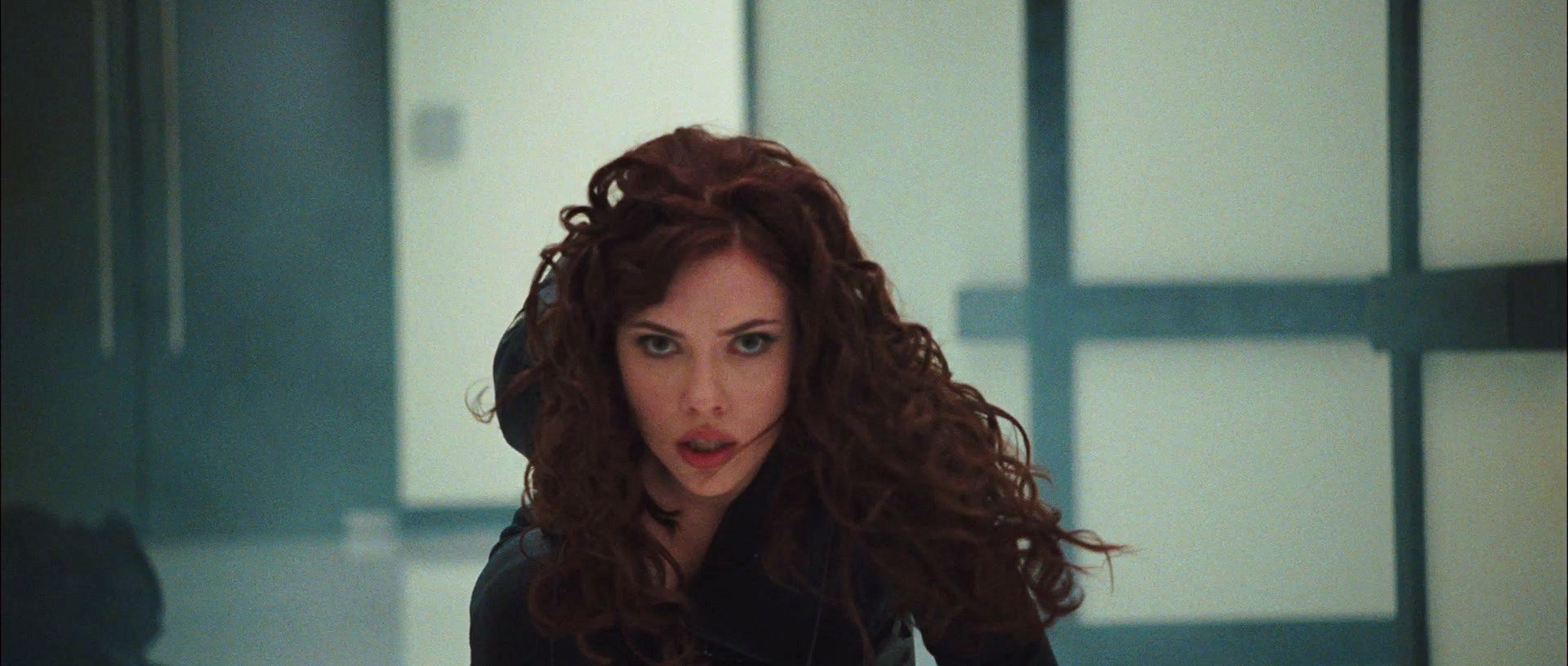 |
| Come on, didn't we all watch Lost In Translation and think "That chick needs to play Black Widow"? |
33.) Batman Forever (1995) dir. Joel Schumacher
This is gonna piss some people off. I know, I know. Nolan's movies are better, dark and gritty blah, blah, blah blah. Just shut up already. As Avengers taught us, sometimes a living comic book can be fun. And Schumacher's Batman was just that. Fun. I had fun at a Batman movie. I didn't meditate on philosophy or think about mutant penguins. I just enjoyed an outlandish Batman movie which brought out the kid in me. This is the Batman of the pre-Frank Miller comics. He wasn't always gritty and tortured, and for fans of that Batman, Schumacher did right by them (though the sequel...not so much). Plus, as silly as it is, there's still less potholes than TDKR. At least Batman was in the suit most of the time, and Robin's name wasn't freaking Robin.
 |
| And I could actually understand what the villains were saying in this one. |
32.) Superman II (1980) dir. Richard Lester & Richard Donner
Let's talk about Zod. Sure, there are some foolish Richard Lester moments in this sequel, like the cellophane S, but as a whole this follow-up to the classic Reeve film did the Man of Steel justice, bringing Krypton to Earth and reminding the viewer how much of a hero Superman really is by seeing the havoc that can be brought on by his Kryptonian counterparts. Superman II is (as of now, Zack Snyer don't let me down) the last great Superman film.
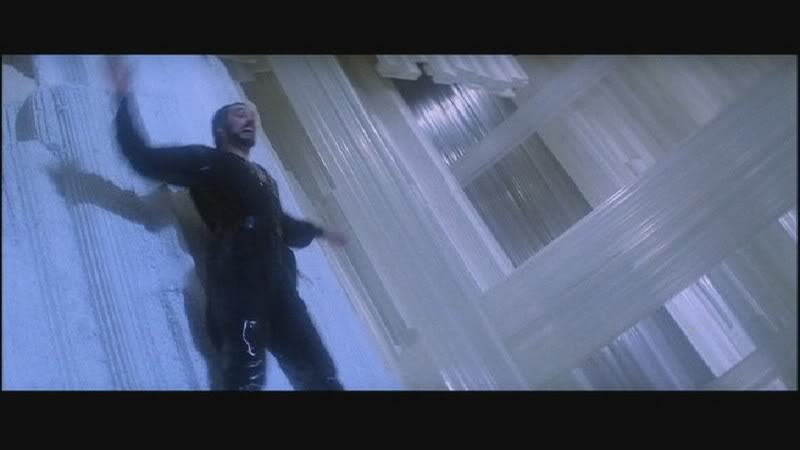 |
| Remember when Superman punched people? |
31.) Ghost World (2001) dir. Terry Zwigoff
If anyone was going to bring Daniel Clowes masterwork of awkward to the screen, it had to be the man who directed a documentary on R. Crumb. With brilliant casting and a screenplay that made Clowes' book more cinematic without losing its spirit in the least, Ghost World captured a subculture that would soon become the mainstream: uncomfortable teenage outcasts.
 |
| If I could have found a screen cap with the Batman mask, god knows I would have used it. |
30.) Batman: Mask of the Phantasm (1993) dir. Bruce Timm
Though Nolan's Batman may be the be-all-and-end-all to most fans now, the modern Batman and his rogues gallery that we all know and love owes less to Frank Miller's comics and more to the Saturday cartoon that legitimized animated kids series, brought in as many adult viewers as kids, and brought the dark knight to a whole new generation. For millions of kids, Bale and Ledger may have had great takes on the classic hero and villain, but to people of my generation, Batman and the Joker will always be Kevin Conroy and Mark Hammill. And nothing proved the power of Bruce Timm's animated Batman more than it receiving its own theatrical film, creating its own characters and taking on a more mature tone than cartoons at the time were willing to go. Keep your Rachel Dawes, I cried more over Andrea Beaumont anyway.
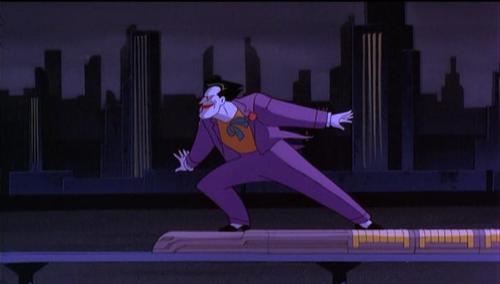 |
| Ladies and Gentlemen, Luke Skywalker. |
29.) The Adventures of Tintin (2011) dir. Steven Spielberg
Both a loving homage to Europe's favorite reporter and Spielberg's best film since Saving Private Ryan, The Adventures of Tintin is fun, thrilling, and everything that played out in the heads of children reading the stories of Captain Haddock and Snowy. Here we see the roots of Indiana Jones finally showing, and I for one was just as pissed about this not receiving an Oscar nod as I was about TDK.
 |
| If THIS is ever given a gritty reboot, my fury will be felt for miles. |
28.) Batman Returns (1992) dir. Tim Burton
Amping up the darkness and not caring who liked it, Tim Burton created a twisted hellscape called Gotham and let the darkest of souls run free. Giving a bland villain like The Penguin humanity by making him inhuman is a feat only Burton could pull off, and even Michelle Pfieffer's sex kitten Catwoman was as demented as they come. As "real" as Nolan's films may feel, Burton's may be more realistic in their insanity. Everyone in Gotham, including Bruce, is one slight push away from a breakdown. Burton realized you'd have to be crazy to put on a costume and roam the streets at night.
 |
| And she's still this hot today. |
27.) 300 (2007) dir. Zack Snyder
Though not a personal favorite, its impossible to deny the visual joy that is 300. Zack Snyder managed to bring Frank Miller's Spartans to life while keeping his distinct visual style, making a comic book movie that no one knew was a comic book, and reviving interest in ancient history. Quotable, memorable, and inimitable (see Meet the Spartans) 300 proves a landmark film in comic adaptations.
 |
| The beginning of the blatant homoeroticism in Snyder's work. Superman should be extra fun. |
26.) Hellboy (2004) dir. Guillermo Del Toro
Though just a warm-up for the career-defining Pan's Labyrinth, Hellboy still brought to life the coolest indie comic character this side of Spawn, eschewing Mike Mignola's caveman art style for a slick, shadowy cityscape. Ron Pearlman plays a dead-on lead, and the mythology of the Hellboy plays brilliantly in this criminally underrated gem.
 |
| I know what you're thinking? Did I fire six shots or only five? Also, you're probably thinking why do I have horns, a tail and rock hands. The answer to one of those questions involves Hitler. |
25.) X-Men 2 (2003) dir. Bryan Singer
In the follow-up to Brian Singer's genre benchmark X-Men, the parable of prejudice is taken to its most extreme with mankind declaring war on the mutant race after one mutant makes an attempt on the President's life. Though Nolan's Batman films are praised for their political subtext, it wouldn't be much of a stretch to see the mutants as modern American Muslims, facing government-sanctioned harassment after one rogue individual commits an act of violence. Of course, the movie is so full of some of the most vibrant and pulse-pounding action, and engaging character development (particularly on the part of Hugh Jackman's Wolverine) that no one would blame you for missing it. Just a little thing to think about when you claim political criticism in comic book flicks started with the Caped Crusader.
 |
| "Oh my god, Wolverine is awesome. And there's gonna be a third X-Men film? And a Wolverine spin-off? Those are gonna be awesome!" |
24.) Heavy Metal (1981) dir. Gerald Potterton
One of the comic book movies with the biggest influence on the animated film industry (and one of the best comic book movies to watch "under the influence"), Heavy Metal tackled 9 different stories from the pages of, or inspired by, Heavy Metal magazine. Using different animation studios with various techniques to bring each story to life, the tales told ranged from futuristic noir to stoner sci-fi; from metal music video to John Candy as a Dr. Manhattan look-alike. The recipient of high praise upon its release, and a classic South Park homage years later, the film has tragically become almost forgotten now. For those uninitiated, you're missing out, so get yourselves on Netflix, and buy your one way ticket to midnight.
23.) Spider-Man 2 (2004) dir. Sam Raimi
How do you make a follow-up to one of the most groundbreaking and engaging movies of the early 2000's? Well, your bring back the original director (Sam Raimi of the Evil Dead series) and writer (Oscar winner Alvin Sargent), have them sift through screenplay drafts crafted by the co-creators of Smallville and a Pulitzer Prize winning author (The Adventures of Kavalier and Clay's Michael Chabon) picking out the parts they liked best, and pulling together a comic book film with the most sympathetic villain to date, Alfred Molina's tragic Doc Ock. Robbed of a hero, robbed of hope, and watching the woman he loves engaged to another man, Peter Parker is ready to give up his alter-ego, until he realizes that the "great responsibility" he took on in the first installment will be there for life.
22.) Men In Black (1997) dir. Barry Sonnenfeld
Anyone who was alive for the zenith of Will Smith's career will remember this fun sci-fi romp, but who remembers Lowell Cunningham's The Men In Black comic that inspired it? Well, thankfully some folks at Columbia Pictures did, and crafted this brilliantly faithful adaptation, the first collaboration between Marvel comics (the publisher of MIB) and Columbia (who would later produce Spider-Man). Sure, we remember it as the campy Will Smith fare of the 90's, but upon rewatching, Men In Black holds up every time.
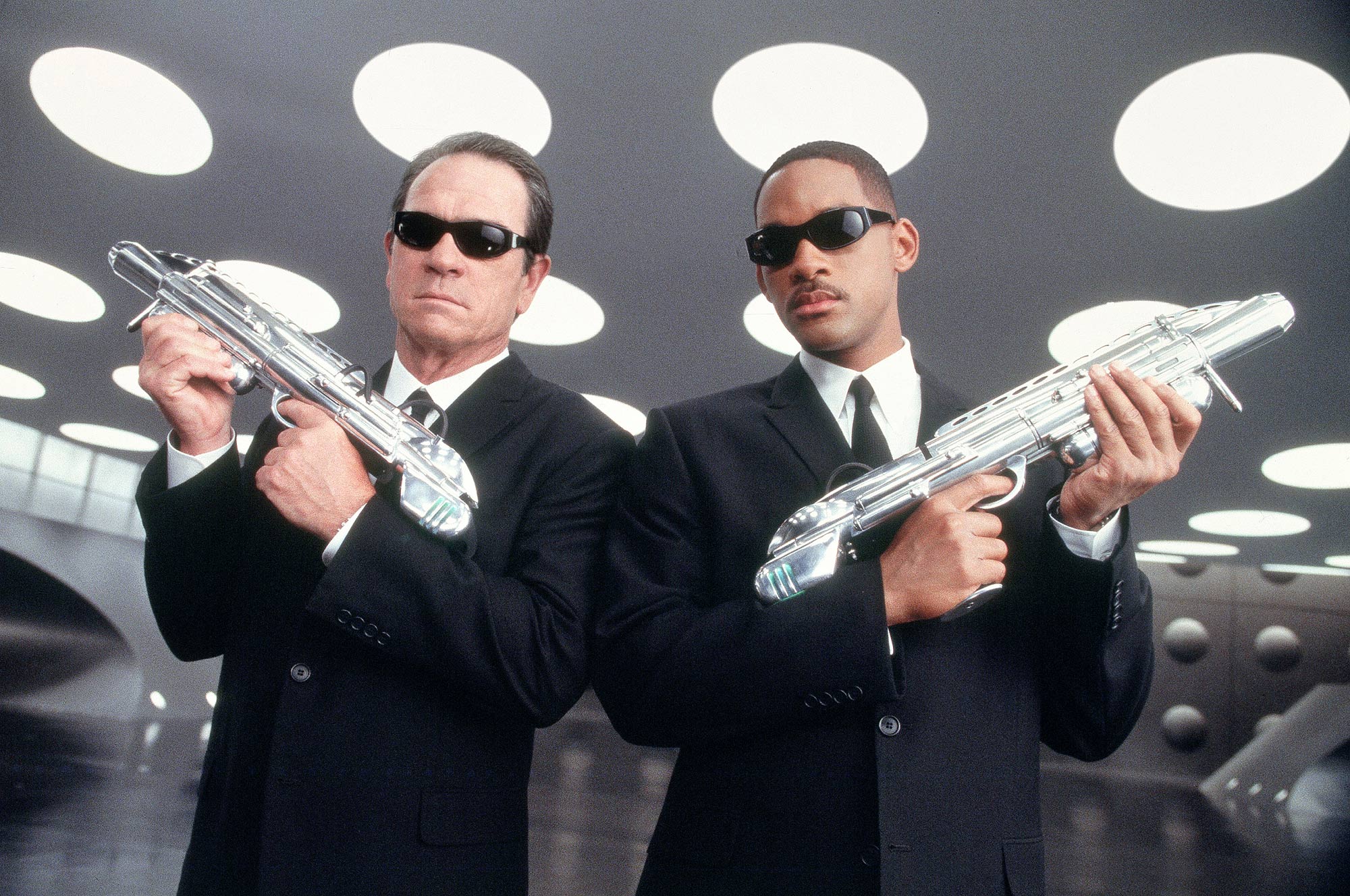 |
| "You know what's the difference between you and me?" "I have an Oscar?" "I make this look...yo man, f*** you." |
21.) Scott Pilgrim vs. The World (2010) dir. Edgar Wright
If you expect straight-forward cinema from the man who helmed Shaun of the Dead and Hot Fuzz, well, you best return your tickets to the Sex Ba-bomb concert now. Bryan Lee O'Malley's manga-comic hybrid is brought to life in stellar fashion by Edgar Wright, who crafted a film with the utmost love and devotion for the source material. O'Malley's books are less a comic than a series of static cartoons, so to translate it to the screen would require a balancing act of absurdism and realism that, to remain faithful to the work, would loose a lot of average filmgoers. And so it did. But in doing so, it brought Scott Pilgrim's quest to defeat Ramona's evil exes to life in a way that's utterly satisfying to fans of the original work and will, in time, be recognized for being what few movies dare to be these days: truly original.
 |
| And if you look here, we'll see the last good thing Michael Cera has given the world. |
20.) The Crow (1994) dir. Alex Proyas
Forever stained with tragedy, Alex Proyas' take on James O'Barr's beloved comic fleshed out the protagonist, making his loss all the more painful. The cinematography of the brilliant Dariusz Wolski took the atmosphere of Burton's Batman and amped it up, making a dark, disturbed atmosphere that keeps a surreal feeling while still capturing the essence of urban decay. Pilfered and homaged by countless comic-book films afterwards (particularly The Dark Knight, whose villain shows flickers of The Crow's mannerisms and goes so far as to homage the "He does that" moment), the film seamlessly works around a tragedy that would halt any other production in its tracks: the death of its lead actor. Of course, those devoted enough to look for it can see where creative edits were made, but to focus on that robs you of the chance to see one of the most stellar performances in comic book movie history. Brandon Lee mixes rage and compassion in his take on Eric Draven, and though he may be gone, his work will forever be remembered.
 |
| Douchebags looking to get laid everywhere, here is your halloween costume. |
19.) X-Men First Class (2011) dir. Matthew Vaughn
Well, thankfully someone appreciated Kick-Ass and felt that Matthew Vaughn was the right choice to revive the then flatlining X-Men franchise. The comic book reboot was by then already a tired idea, and even when the trailer was released, with that dude from Inglourious Basterds and the guy from Atonement as Magneto and Professor X, expectations were low. It seemed like everyone assumed the film would come and go as a bland entry to a dying series. The public has never assumed so wrong. The film soars with memorable sequences, high-octane action, and an engaging story with fascinating and sincerely human characters, tackling Marvel's greatest villain with compassion and dignity. With one 60's set adventure, Vaughn changed moviegoers' tune from "Another X-Men movie?!?" to "I hope they make another one." And for that, high praise is deserved indeed.
 |
| When Katniss joined the X-Men. |
18.) Dick Tracy (1990) dir. Warren Beatty
The comic book movie with the most Oscars, it's almost wrong to call Dick Tracy a comic book adaptation. Warren Beatty's film didn't "adapt" Chester Gould's famous gumshoe to the screen. Everything from the dialogue to the costumes to the stones in the sidewalk were lifted straight from the classic comic strip. There are two ends to the comic book movie spectrum; you either take character names and certain concepts and mold and adapt them to make a realistic film that bares little resemblance to the source material (A la The Dark Knight Rises) or you remain utterly faithful, bringing every Ben-Day dot to vibrant life on screen, eschewing realism completely. Dick Tracy did the latter to the utmost extreme and did it with such style and flair that fans of Dick Tracy, young and old, can't be disappointed.
 |
| Because once upon on a time, Warren Beatty was a thing. |
17.) American Splendor (2003) dir. Shari Springer Berman &Robert Pulcini
In this writer's humble opinion, Harvey Pekar was the comics what Hemingway was to literature: A landmark figure changing how we viewed the medium, whose work was universally relatable but uniquely American. Writing-wise, though, Pekar shared more in common with Kerouac: a free-form jazz feel, somehow both descriptive and minimalist, with an earnest autobiographical nature. To try and bring Pekar's American Splendor books to the big screen would mean one would have to make something equal parts sincere and meta, a post-modern drama that hit on a wholly human level. Yet somehow this gargantuan task was undertaken successfully by two documentarians, mostly due to the brilliant casting of Paul Giamatti as the stand-in for the late Pekar. Splendor satisfied long-time pekar fans and brought many uninitiated into the fold, discovering Harvey's brilliant depiction of modern life.
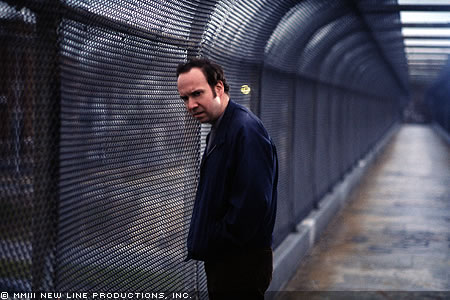 |
| The film that made Paul Giamatti an international sex symbol. |
16.) X-Men (2000) dir. Bryan Singer
Grabbing the baton and running full-speed with it, the superhero movie was revived with Bryan Singer's marvelous take on the classic mutant team. Showing you could change details (like the costumes) and still keep the fanboys happy, Singer brought in viewers who'd never touched the plastic comic book sleeve and made them want to join Xavier's School for Gifted Youth before movie fans wanted to enroll in Hogwarts. Making Hugh Jackman a star and paving the way for comic book movies, X-Men also had a layer of social commentary and a thrilling plot which has helped the film stand the test of time. Even after all the reboots and sequels, the X-Men have never been done better.
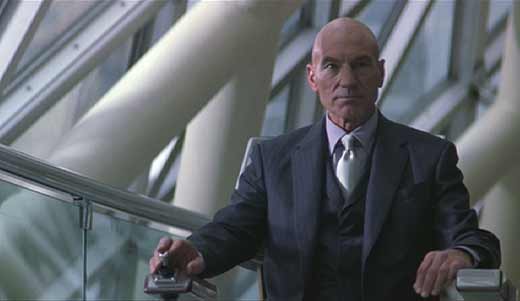 |
| He commanded the Enterprise and the X-Men, ergo he is better than all of us. |
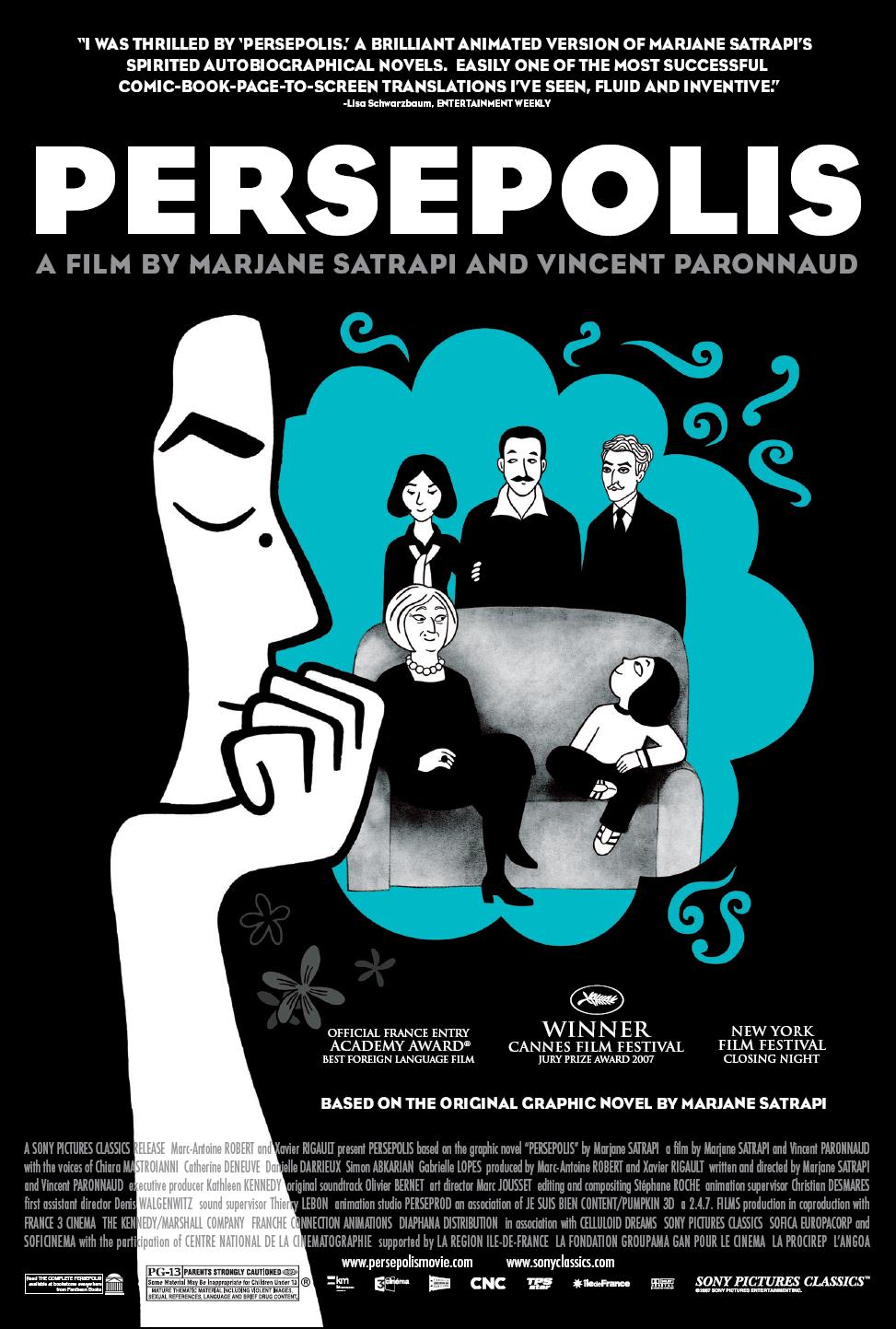 15.) Persepolis (2007) dir. Marjane Satrapi & Vincent Paronnaud
15.) Persepolis (2007) dir. Marjane Satrapi & Vincent Paronnaud
If you talk to anyone knowledgable the art form of the graphic novel, and not just the superhero, odds are the name Marjane Satrapi will come up. Along with Art Spiegelman's Maus, Satrapi's Persepolis legitimized the graphic novel in the eyes of literary scholars with its candidness, and use of images and imagery together in a way that proved the comic book format was the best medium to tell the story. Yet, when Persepolis came to the screen, it made readers of Marjane's autobiography realize just how cinematic her story was. The animation was serene and yet childlike, with a French sensibility towards the bleak Iranian government overthrow. Of course, it doesn't hurt that Marjane herself directed the film. Persepolis is one of the few examples where a graphic novel worked just was well on screen as on paper. Speaking of which...
 |
| The cutest little movie about Iranian oppression ever. |
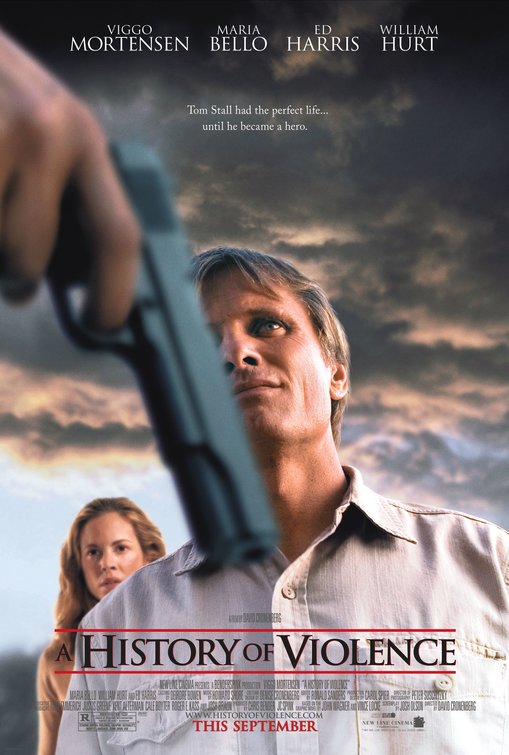
14.) A History of Violence (2005) dir. David Cronenberg
Though he recently came out
against comic book movies, somebody might want to remind the
Videodrome director he actually made one in 2005. A gritty and compelling tale of the sins of youth, Cornenberg directed Viggo Mortensen to his best performance to date, and got William Hurt an Oscar nod for his terrifying supporting role. In genre which typically features men in tights, Cronenberg brought us a comic book movie smoldering with realism.
 |
| Yes, this is what he does if you tell him The Road sucked. |
 13.) Spider-Man (2002) dir. Sam Raimi
13.) Spider-Man (2002) dir. Sam Raimi
Blade showed Hollywood comic book movies had potential. X-Men hinted that there was greatness lying dormant in the pages of Marvel books, that someone could make a great movie, not just a great superhero movie. Someone did. Sam Raimi. From the brilliantly shot action sequences to the stirring Danny Elfman score, Raimi concocted the iconic superhero film for his day, and the web-slinger once relegated to the realm of camp cartoons became a symbol. Peter Parker was the American everyman, and just a year after the tragedy of 9/11 made New York feel safe again for the kids who had witnessed the horror. With a comic book feel that was still in every way believable, Raimi played a brilliant balancing act between comic book loyalty and believable storytelling, and in the process making one of the most romantic scenes in Hollywood history: The upside-down kiss.
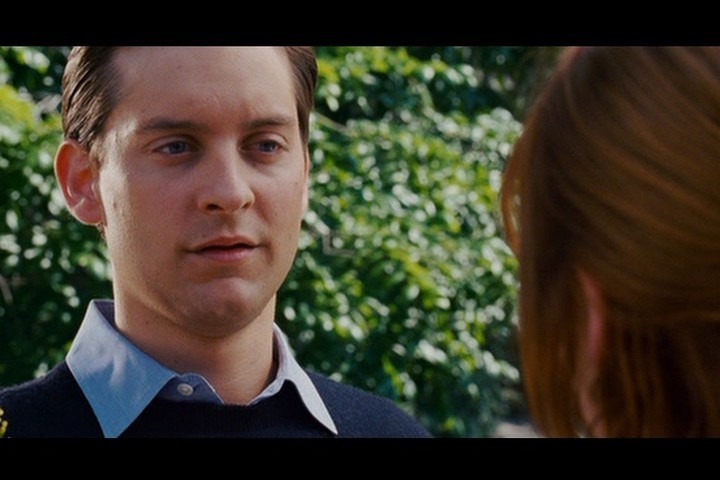 |
| The Spider-Man that didn't co-found Facebook. |
 12.) Ghost in the Shell (1995) dir. Mamoru Oshii
12.) Ghost in the Shell (1995) dir. Mamoru Oshii
Based on the stellar sci-fi manga by Masamune Shirow, Oshii's anime adaptation actually surpasses its graphic novel in terms of pacing and thrills, being a must-see for those uninitiated in the anime genre, as well as changing the game by brilliantly blending computer animation and traditional work. Robbed and homaged by almost every filmmaker since, most blatantly by the Wachowski brothers with The Matrix, Ghost in the Shell has spawned sequels and spin-offs, but nothing has ever been as pulse-pounding as Major Matoko's first hunt for "The Puppet Master".
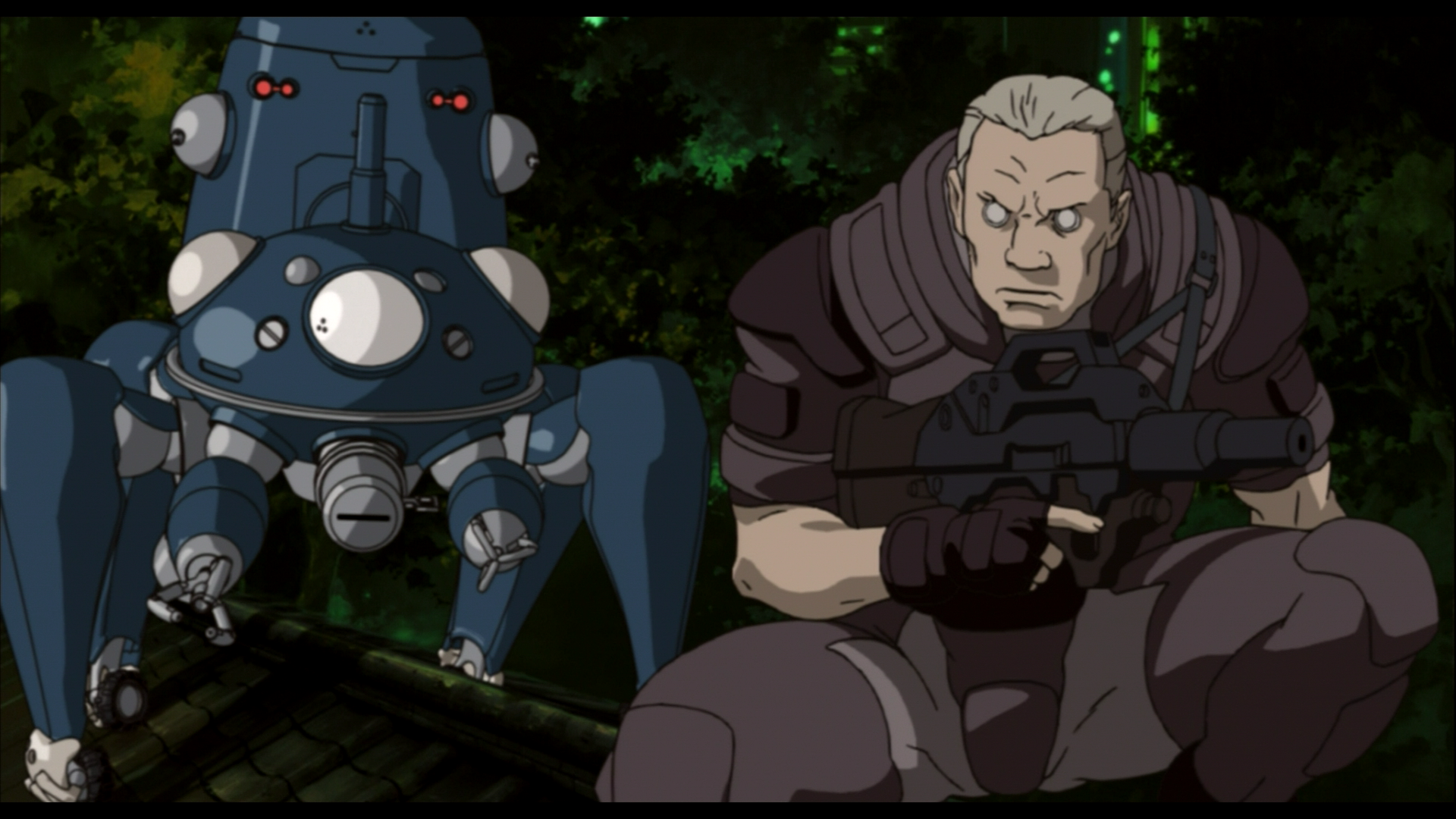 |
| Nah, this doesn't feel like The Matrix at all. |
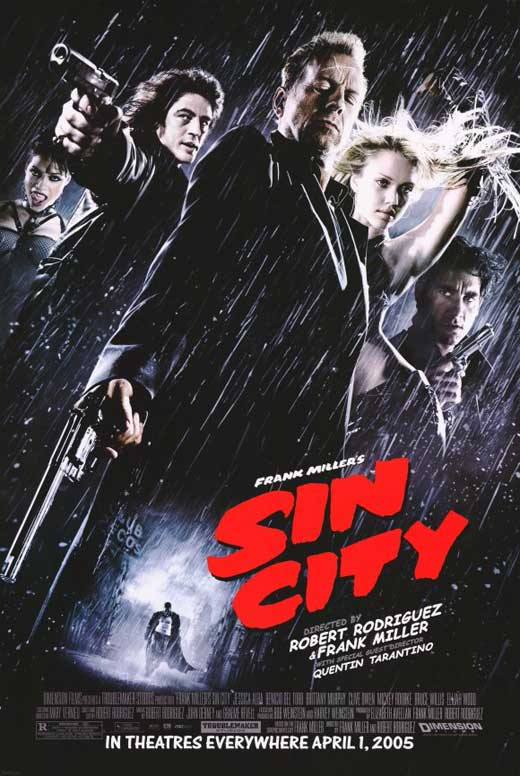 11.) Sin City (2005) dir. Robert Rodriguez
11.) Sin City (2005) dir. Robert Rodriguez
An homage to the noir genre to the point of parody, Robert Rodriguez captured the tone, the look and the spirit of Frank Miller's comic series flawlessly. Perfectly cast, perfectly shot, and perfectly edited, the stories of Marv, Miho and that Yellow Bastard came to life so sharply that you wouldn't believe this same man made Spy Kids. Taking all of the potential and drive he showed in El Mariachi and throwing it full force into the dark, seedy, stylized world Frank Miller crafted at his most Frank Miller-est, Sin City is a stellar film, a classic both of the genre and of 2000's cinema in general, which will go down as a highlight, if not the apex, of Rodriguez's career.
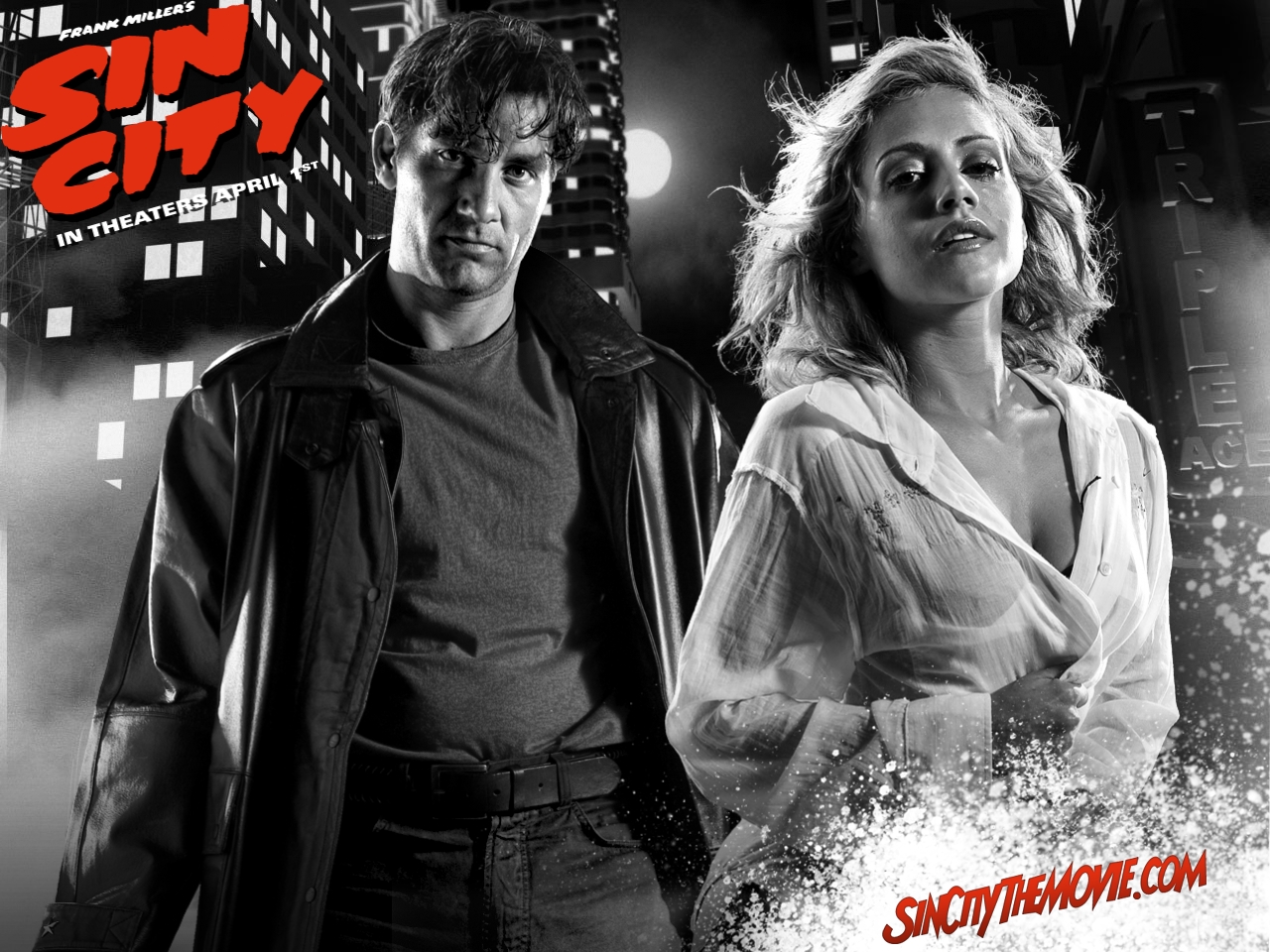 |
| And the sequel promises even more blood, guns and sexism. |
10.) Iron Man (2008) dir. Jon Favreau
Who would have thought one of the least known top-tier Marvel characters would become one of the most beloved superheroes of cinema? How did this happen? Well, Jon Favreau had a good script, yes, but in this case it was all about the star. Resurrecting his career (destroyed by his ego and alcoholism) by playing an egotistical alcoholic, Iron Man changed the game. While Nolan's Batman was serious, brooding, a tortured soul as a metaphor for a crumbling society in need of hope, Downey's Iron Man was partying, flying around and was a metaphor for...well, being awesome. The man needs no dramatic score; he gets AC/DC. He has no conflict after the first 15 minutes, he's not tortured. He's just Tony Stark. That's what made us love Iron Man so much. We didn't have to feel bad for him. We loved him because he loved himself. It wasn't moving or meaningful, it was fun. It kept the youthful spirit of comics, and helped Marvel set itself apart from its dark DC counterpart.
 |
| Atlas Shrugged in badass armor. |
 9.) V For Vendetta (2006) dir. James McTeigue
9.) V For Vendetta (2006) dir. James McTeigue
To explain the cultural significance would be pointless. One need only attend practically any protest to see young men and women donning the face of Fawkes in protest. Before this film, the story of Guy Fawkes' deranged plan for anarchy was known only to Alan Moore fans and the Brits. Moore's work has never been treated kindly by Hollywood (From Hell, The League of Extraordinary Gentlemen) and when it was revealed that changes would be made to Moore's beloved graphic novel, it was the sign of another disgrace on the horizon. But credit must be given to the Wachowski brothers: the trimmed the fat of Moore's novel, added some elements, and over-all made something less dreary, more inspiring, and that better conveyed the message of the original work than the work itself did.
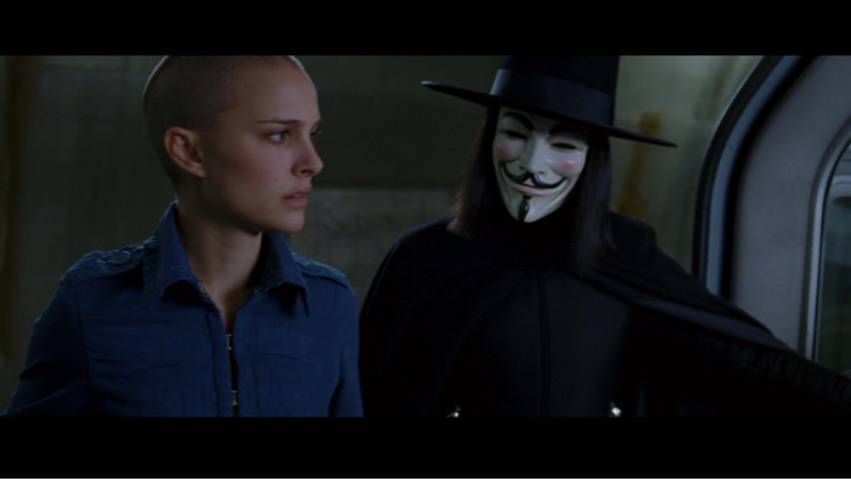 |
| One of those movies Natalie Portman cared about. |
 8.) Batman Begins (2005) dir. Christopher Nolan
8.) Batman Begins (2005) dir. Christopher Nolan
The beginning of The Dark Knight Trilogy has a kind of sleeper genius. The first time you see it, nothing stands out, but like Nolan's later film Inception, the film plants a seed in your mind. You're still thinking about it months later. Set in a terrifyingly dark Gotham, Batman had a more mature tone than any comic book movie prior, tackling topics like terrorism and the power of fear. Realism was key in Nolan's Gotham, with every aspect being gritty and believable, revamping characters (and cars) to keep with the idea that this could actually happen. Taking twists and turns not expected by even the most ardent Batman reader, Nolan's take on the Dark Knight was new and unique while still being true to the character. He took Batman seriously, without being pretentious, and added an air of sophistication and respectability to the then blossoming genre.
 |
| Before the voice got too gravely. |
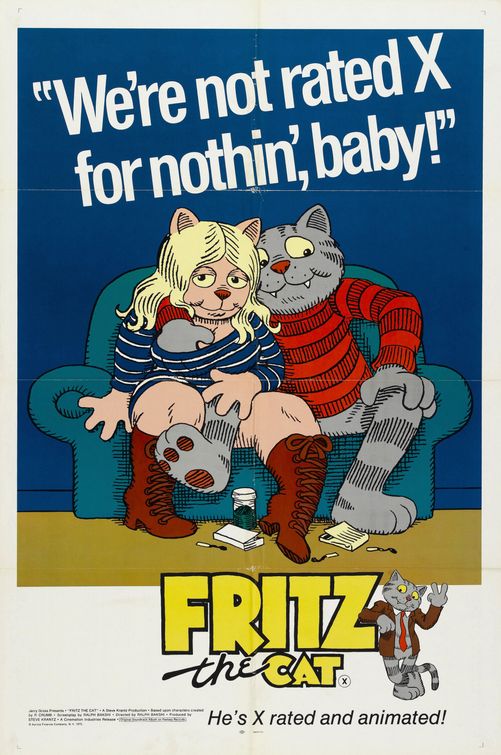 7.) Fritz The Cat (1972) dir. Ralph Bakshi
7.) Fritz The Cat (1972) dir. Ralph Bakshi
The highest grossing independent animated feature of all time came from the brain-child of the greatest independent comic book artist of all time, which is fitting. Both pushed the boundaries of their medium, both took their art forms to sexual and violent places they had never been before, and ultimately both connected with the public in a big way. R. Crumb's Fritz The Cat series was taken on by underground animation legend Ralph Bakshi, the resulting film became the first X-Rated animated film, as well as an important benchmark in the evolution of animation. Fritz the Cat wasn't mere pornography, but instead stood as a social satire of the supposed"intellectual" college kid of the 60's and 70's, and showed animators they needn't be bound by the shackles of "Disney decency".
 |
| This is...literally the only non-pornographic screen cap I could find. |
 6.) Oldboy (2003) dir. Park Chan-wook
6.) Oldboy (2003) dir. Park Chan-wook
For the middle (and arguably best) part of his Vengeance Trilogy, Park Chan-wook took on Nobuaki Minegishi and Garon Tsuchiya's ultra-violent manga. While most films focus on the relief or lack there of of revenge, the revenge itself is a simple act the story build towards. Oldboy, however, takes the theme of revenge and examines it from all angles, showing the horrific and maddening lengths man will go to enact his own form of justice. It feels unfair to even discuss the film on the off chance those reading this have yet to see it, but simply put: Oldboy is one of the finest Korean exports in recent memory, if not of all time, and beneath the blood and gore is a smoldering suffering which strips mankind down to its basest, rawest emotions. Now go out and rent it.
 |
| You don't even wanna know what he does with the hammer. Actually, you do. Its awesome. Rent this. Now. |
 5.) The Avengers (2012) dir. Joss Whedon
5.) The Avengers (2012) dir. Joss Whedon
Let me clarify from the start that I don't believe Whedon's superhero team up is artistically superior to the work of Park Chan-wook or Marjane Satrapi. However, Whedon did achieve something remarkable. He brought a comic book to life without an ounce of camp and made a universally enjoyable film that gleefully danced across a tightrope without falling into the role of "big dumb action flick". Built on several Marvel films (Iron Man, Iron Man 2, The Incredible Hulk, Captain America and Thor), The Avengers exceeds them all with a youthful sense of adventure on par with what the youth of the 70's felt seeing Star Wars or the 80's children felt during Raiders of the Lost Ark. Witty, fun, and not for a moment dull or self-indulgent, Whedon crafted film candy of the highest caliber, and captured the spirit of Marvel comics whole-heartedly that only the most bitter and jaded filmgoers could hate.
 |
| It only took them a TV show and three movies to get it right. |
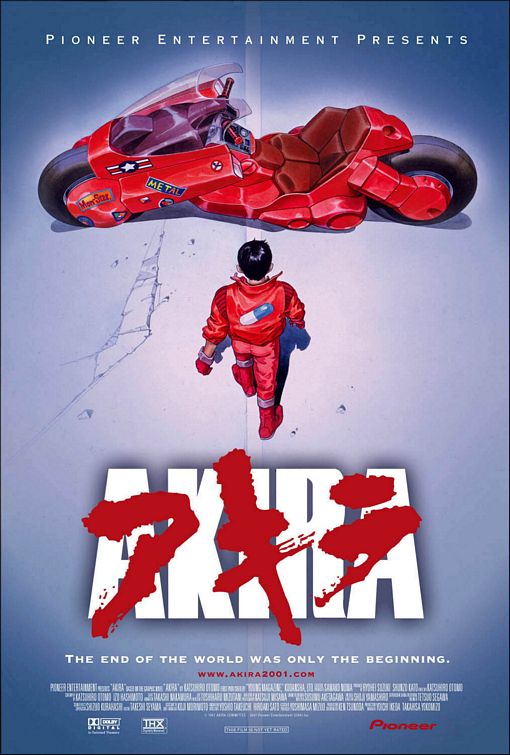 4.) Akira (1988) dir. Katsuhiro Otomo
4.) Akira (1988) dir. Katsuhiro Otomo
With perhaps the exception of Spirited Away, Akira is widely considered the greatest anime film of all time, and I wouldn't disagree in the least. Otomo helmed the adaptation of his own beloved epic manga saga in order to ensure that while the story was changed for cinematic reasons, the spirit and tone of the manga remained. One of the first anime to make the transition overseas, Akira was a huge success and did things that neither the anime nor science fiction genres had done before. Friendship, power and corruption are abound in this morality play set in a dystopian future, which plays out like Blade Runner on amphetamines. Violent, colorful and a visual delight which put anime back on the map.
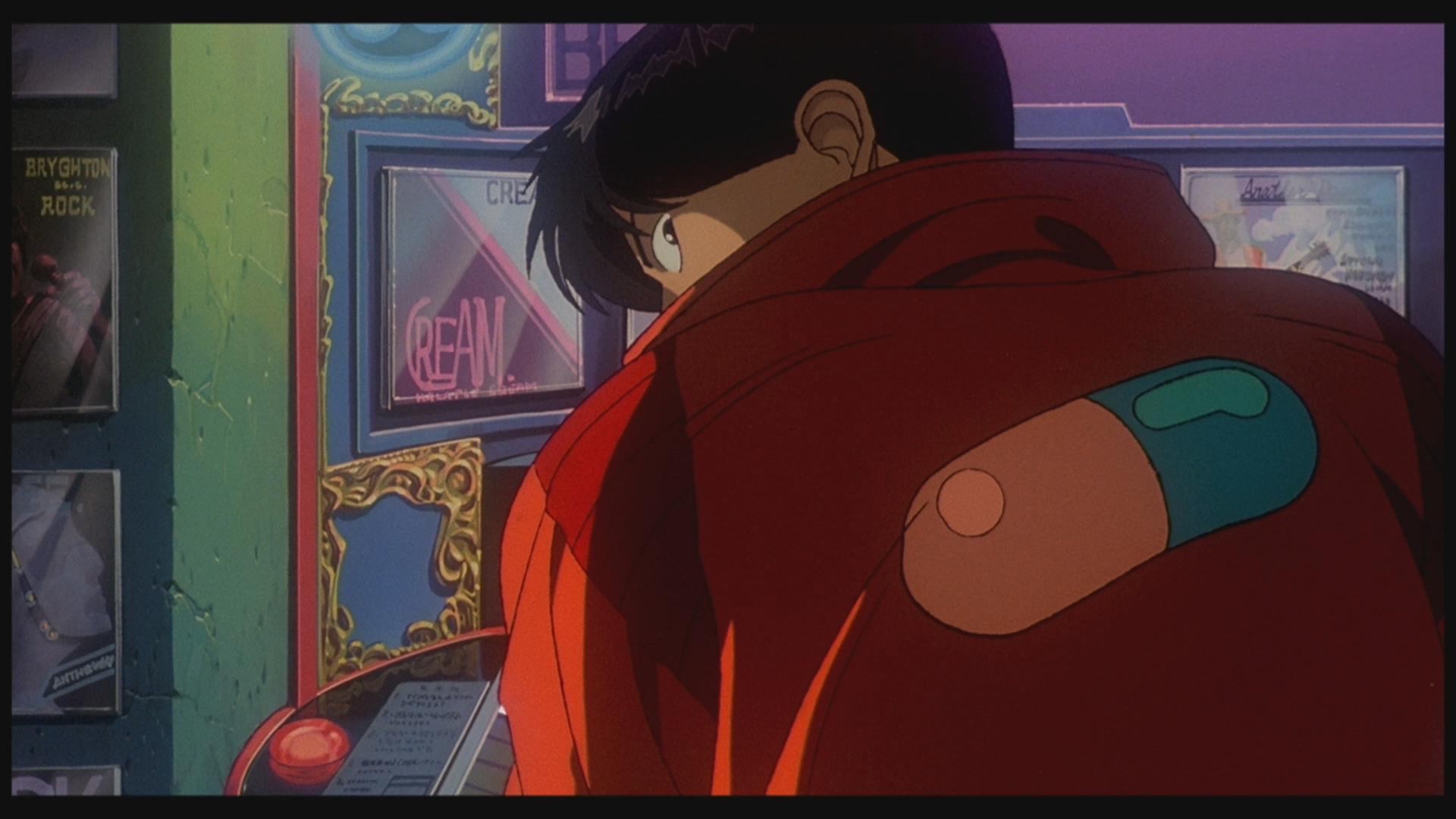 |
| After seeing the film, you will search eBay for the jacket. |
 3.) Superman (1978) dir. Richard Donner
3.) Superman (1978) dir. Richard Donner
Arguably the greatest superhero of all time in what is inarguably his greatest movie. Yes, its campy. Its campy to the extreme. But it meant to be.
Superman, from the clothes to the sets to the colors, is a living comic book. The classic Man of Steel books of yesteryear brought to life on screen, and the most faithful adaptation of the superhero source material you'll find. Of course, in the light of the obsession with "dark, gritty and real", the film falters, but its not about that. It's about childlike wonderment, it's about the good, honest power of Superman, the sincerity of it all. He's not a tortured soul, but merely a good-hearted young man with a sense of purpose, played inimitably by the late Christopher Reeves. And say what you will about the Caped Crusader, nobody cared when Rachel blew up like we did when Lois died. We all wanted to spin the world backwards then. It is a comic book through and through, and maybe not the bleak, murder-filled darkness everyone prefers, but for what it is, it's perfection. Let go of the obsession with brooding, turn on your inner child, and watch. You will believe a man can fly.
 |
| The only Superman. |
 2.) Batman (1989) dir. Tim Burton
2.) Batman (1989) dir. Tim Burton
Though now derided by most Nolan-ites for being "cartoonish", upon its release some criticized the film for being "too dark". Burton's original (in so many meanings of the word) take on Batman proved groundbreaking, laying the foundation for every comic book movie with any sense of realism. While changing aspects of the Batman mythology, Burton got to the heart of the series, and managed to turn the unheroic Michael Keaton into the most believable Bruce Wayne in the history of the character. Madness pervades the Gotham Burton hath wrought, and Bruce Wayne isn't a symbol for justice so much as Hamlet; a man of questionable sanity seeking revenge for the death of family. While still keeping the comic book vibe, Burton's Batman appealed to an older audience, with a Joker who got more screen time than the caped crusader, and a Batman that was more Frank Miller than Adam West. The evolution of the modern superhero flick starts here, planting the seeds for what would become the most critically beloved and greatest comic book film of all time...
 |
| When you needed a guy to play crazy in the 80's, this was your man. |
 1.) The Dark Knight (2008) dir. Christopher Nolan
1.) The Dark Knight (2008) dir. Christopher Nolan
...this guy right here. I almost don't need to argue it. Anyone who was alive for its release knows how this film took the world by storm. A lecture in politics and philosophy disguised in a cape and cowl, with the most compelling performance this side of Hannibal Lecter thanks to posthumous Oscar winner Heath Ledger. Legitimizing the comic book film to all but the crotchety-est Hollywood has-beens, The Dark Knight is for comics what The Exorcist was for horror, or Unforgiven was for the Western. An artistic take, a philosophical meditation, a critical darling, and a genre defining, game changing masterwork.
 |
| And here...we...go |
Well, there ya go. Feel free to argue in the comments section, folks.

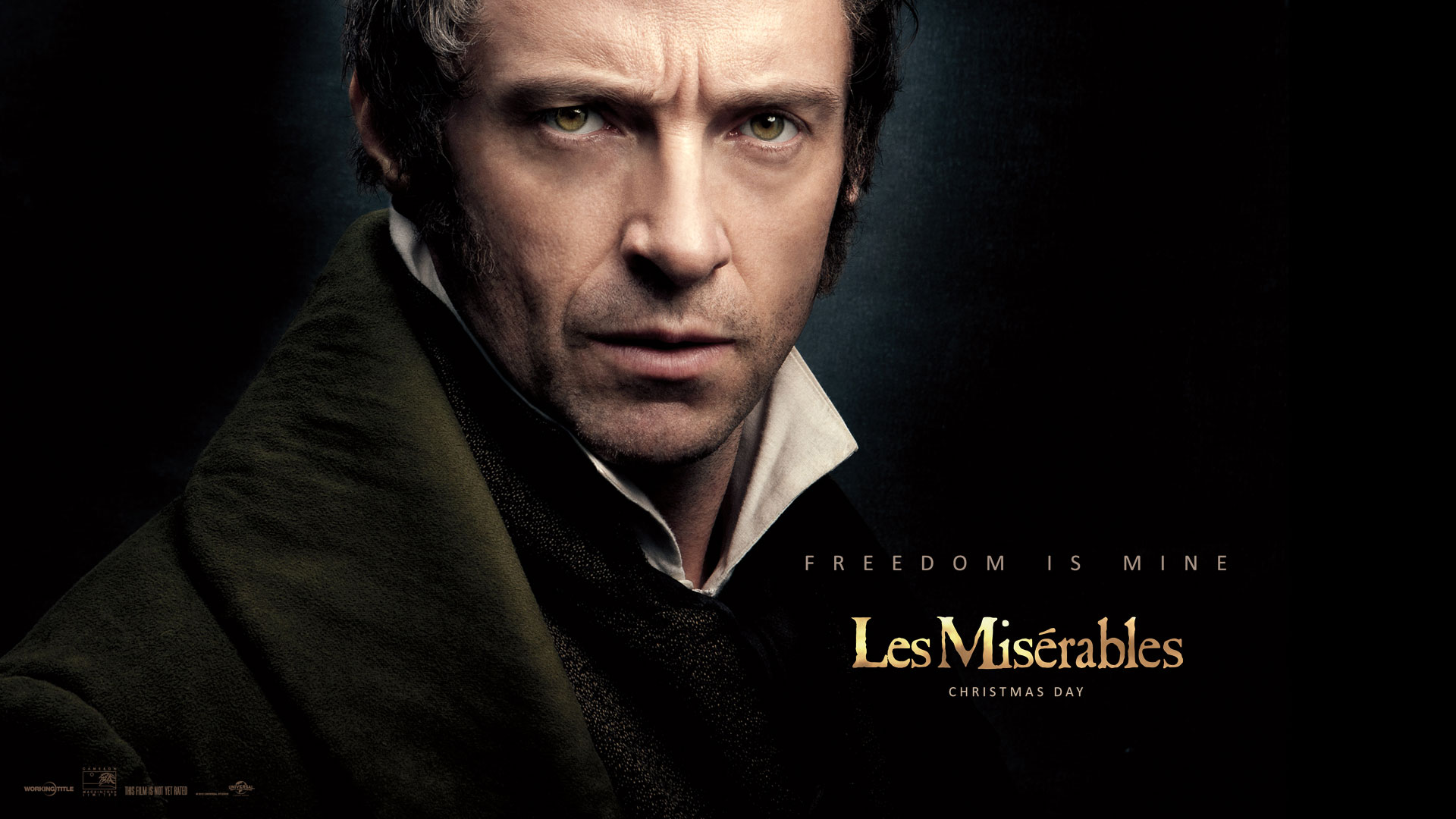




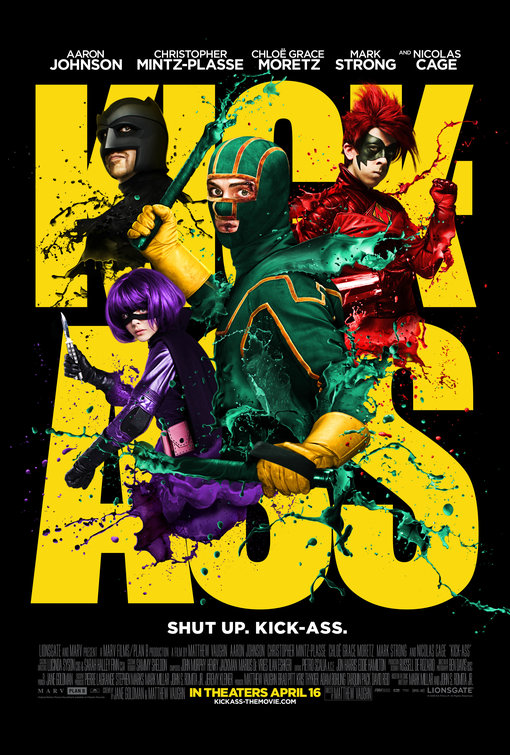









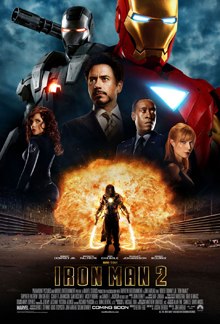





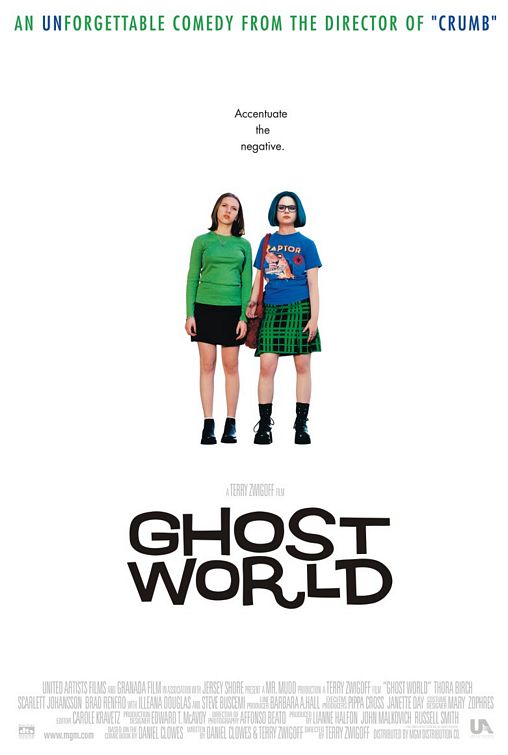













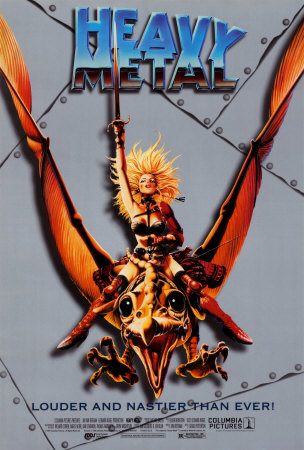

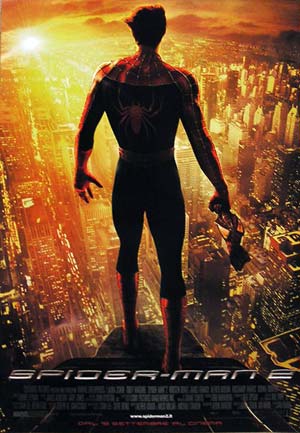

.jpg)



